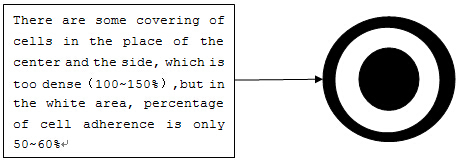Team:SUSTC-Shenzhen/Notebook/HeLa Cell/blasticidin screening
From 2014.igem.org
Notebook
Element of an endeavor
HeLa Cell
2014 To test the restriction of HeLa cell to blasticidin2014.8.8, 10:00
Material
Blasticidin, Hela cell, 24-holes plate
Results
Experimental group:
Row 1(0.5~1.6 ug/ml) still have many cells attach to the bottom
Row 2,3(1.8~4ug/ml) can clearly see some cells fall off, and mostly are single cell
Row 4(5~9ug/ml) certainly the cells fall off multiply
Control group(0ug/ml):
there are few fallen cells, it should be normal
Repeat group:
Just see several cells become orbicular, and the fallen cells in all holes are less than experimental groups
Description
The cells grew asymmetric, more concentrated in the center but rarer in the surrounding, and the gradients are too dense to watch out for. We infer we can get the result after 2~3days
Discussion
There is situation that we add the antibiotics asymmetric, and we used a wrong way to mix up the cell with the solid medium
2014.8.8, 4:00~5:20
Results
Experimental group
| 8.0ug/ml,5% cells adherence,almost cells float | 0.5ug/ml,90% adherence,several float | 1.0ug/ml,same as left,same as left | 1.2ug/ml,same as left,same as left | 1.4ug/ml,same as left,floated cells increase | 1.6ug/ml,same as left,same as left |
| 1.8ug/ml,60%~70% adherence | 2.0ug/ml,same as left | 2.2ug/ml,50%~60% adherence | 2.4ug/ml,40%~50% adherence | 2.6ug/ml,same as left | 2.8ug/ml,same as left |
| 3.0ug/ml,50%~60% adherence(increase) | 3.2ug/ml,same as left | 3.4ug/ml,same as left | 3.6ug/ml,same as left | 3.8ug/ml,same as left | 4.0ug/ml,same as left |
| 5.0ug/ml,adherence(decrease) float cell(increase) | 6.0ug/ml,same as left | 7.0ug/ml,same as left | null | null | null |
Repeat group
Totally, the tendency is the same as the experimental group, but there are some micro differences, the percentage of adherence is higher, meanwhile, the float cells are less than another group.
Description
The result is not the same as yesterday, and the spreading of cells is not the same

8.10, 9:45
Result
| A | 8.0ug/ml | 0.5ug/ml | 1.0ug/ml | 1.2ug/ml | 1.4ug/ml | 1.6ug/ml |
|---|---|---|---|---|---|---|
| B | 1.8ug/ml | 2.0ug/ml | 2.2ug/ml | 2.4ug/ml | 2.6ug/ml | 2.8ug/ml |
| C | 3.0ug/ml | 3.2ug/ml | 3.4ug/ml | 3.6ug/ml | 3.8ug/ml | 4.0ug/ml |
| D | 5.0ug/ml | 6.0ug/ml | 7.0ug/ml | null | null | null |
Experimental group
A:only about ten cells in the sightseeing
B:the float cell begin to increase from2.0ug/ml
C:more float cells, and certainly in the 3.4ug/ml, plenty of float cells in the 4.0ug/ml
D:few adherence cells(except 7.0ug/ml)
Repeat group
A:few adherence cells
B:same as experimental group
C:an increase of float cell
D:almost same as C
Description
0.5ug/ml very dense(100%+)
1.4ug/ml and 1.6ug/ml have more float cells
Few holes, such as 1.6ug/ml have big blank area
8.10, 5:20
Just renew the medium of cell
8.11
Simple note
The experimental group(D4, a null hole)has an infest of mold, and we abandon this plate.
Analysis
1.the medium was emptied and the mold cannot be restricted by the antibiotics.
2.maybe we did some not standard operation.
 "
"